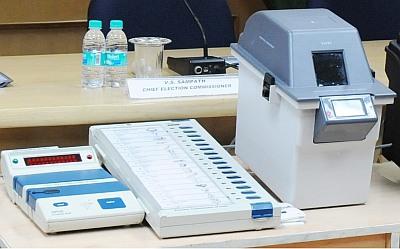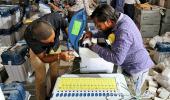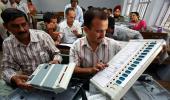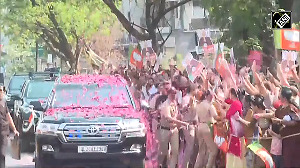 The Supreme Court directed the Election Commission on Monday to increase random matching of Voter Verifiable Paper Audit Trail (VVPAT) slips with electronic voting machines to five polling booths per assembly segment, from one at present, in the upcoming Lok Sabha polls saying it will bring more 'credibility' and 'integrity' to the electoral process.
The Supreme Court directed the Election Commission on Monday to increase random matching of Voter Verifiable Paper Audit Trail (VVPAT) slips with electronic voting machines to five polling booths per assembly segment, from one at present, in the upcoming Lok Sabha polls saying it will bring more 'credibility' and 'integrity' to the electoral process.
The apex court however did not agree to the demand of 21 Opposition leaders, led by Andhra Pradesh Chief Minister N Chandrababu Naidu, for counting of at least 50 per cent of the VVPAT slips with EVMs per assembly segment.
The EC currently follows a system of random counting of VVPAT slips in one polling booth per assembly segment of a Parliamentary or assembly constituency.
"It is our considered view and having regard to the totality of the facts, it would generate greater satisfaction and will foolproof the electoral process if number of VVPAT machines is increased to five per assembly segment of each Parliamentary constituency," a bench headed by Chief Justice Ranjan Gogoi said.
The bench, also comprising Justices Deepak Gupta and Sanjiv Khanna, made it clear that the existing mechanism of random process to select EVMs for VVPAT slips matching as being done by the poll panel would continue to apply.
"We are of the view that if the number of EVMs in respect to VVPAT is subjected to physical scrutiny be increased from one to five per assembly segment...there will be greater satisfaction not only to the political parties but also to the voters," the bench said.
It emphasised that increasing the number of EVMs for VVPAT slips matching per assembly segment would neither require additional manpower and infrastructure nor delay the declaration of result.
The bench interacted with the Deputy Election Commissioner Sudeep Jain who said that presently the poll panel matches VVPAT paper slips of 4,125 EVMs under the one EVM per assembly segment guidelines.
He said that increasing the number of random sample size checking of VVPATs slips with EVMs would lead to more manual counting and hence it would be more prone to error.
Jain told the court that at present three election officials, one returning officer and one observer, who happens to be a senior civil servant, are deployed to undertake the random checking of VVPAT slips with one EVM and increasing the sample size would require more workforce.
Senior advocate C A Sundaram, appearing for EC, said that it was the constitutional duty of the poll panel to ensure free and fair election in the country and it has put forth the difficulties posed in increasing the sample size in view of the allegations of leaders of different political parties which was only based on their perception.
Senior advocate A M Singhvi, appearing for the opposition leaders said that the delay of 5.2 days, as the EC claims, will occur only if the Commission choose to not increase its present workforce from one person but the delay would be substantially reduced if the workforce is increase by even one person.
He said that they do not mind a delay of six days in declaration of Lok Sabha election results for counting of 50 per cent of VVPAT slips if it ensures the integrity of the electoral process.
Singhvi said that increasing the sample size would instil a sense of confidence in the minds of the general public that the elections are free and fair.
The 21 political leaders in their affidavit has said 'The present guideline issue by ECI makes VVPAT completely ineffective and merely ornamental in nature. It defeats the entire purpose of introducing VVPAT and renders the judgement and directions passed by the court completely otiose'.
"The petitioners submit that even if just one official per booth has been sensitised, it is not difficult at all, much less an 'insurmountably' difficult, to sensitise one or two officials and the ECI should not be permitted to resist increase of percentage or numbers of EVMs to be verified/checked against VVPAT on this ground," they said in their submission to the court.
The EC has submitted to the court that any increase in the sample size of verification from the existing norm of one polling booth per assembly segment would lead to very negligible gain in the confidence level, which is way above 99.99 per cent.
It has stated that increased VVPAT slip counting will require extensive training and capacity building of election officials.
"It is further submitted that when the polls are imminent and polling is to commence from April 11, 2019, to now seek to alter the system adopted by the Election Commission of India at this stage might not be feasible," the poll panel has said.
Naidu and others had sought in their plea that VVPAT slips of at least 50 per cent of voting machines in each assembly constituency be matched during counting of votes this general election and assembly polls.











 © 2025
© 2025